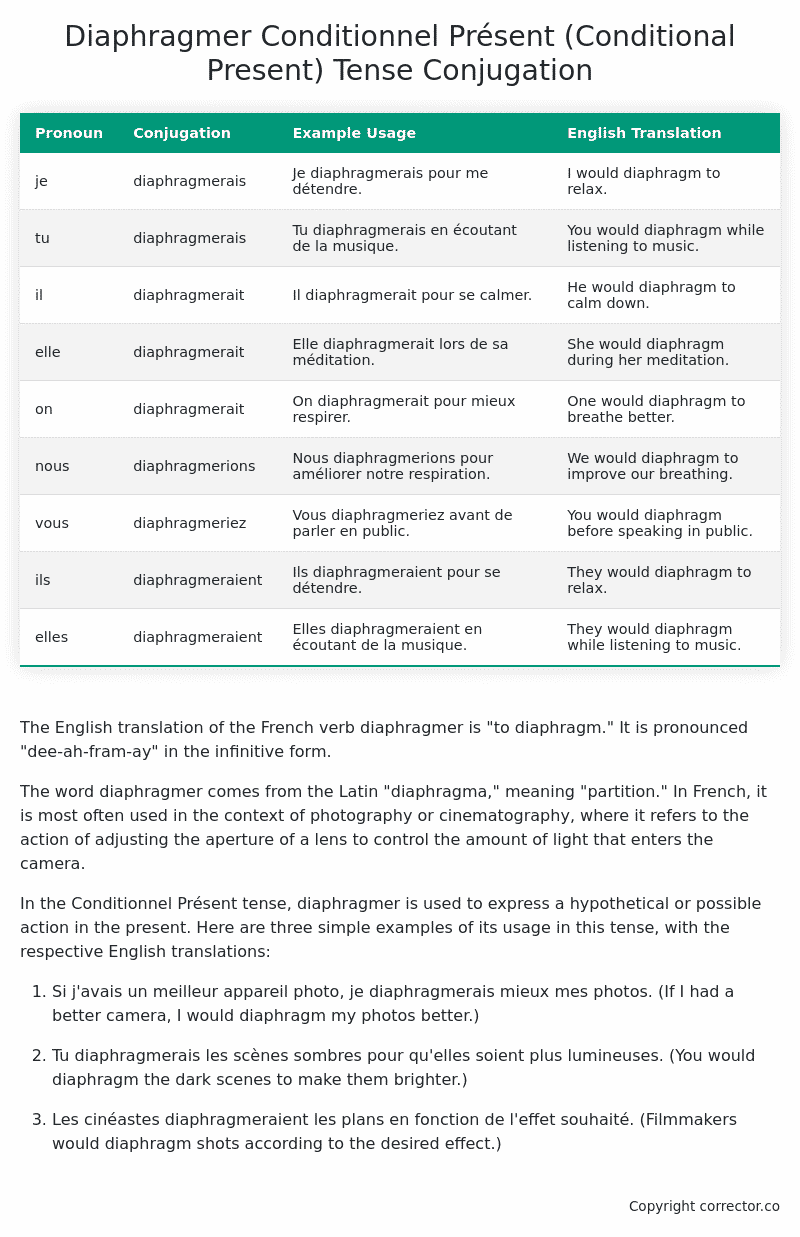Conditionnel Présent (Conditional Present) Tense Conjugation of the French Verb diaphragmer
Introduction to the verb diaphragmer
The English translation of the French verb diaphragmer is “to diaphragm.” It is pronounced “dee-ah-fram-ay” in the infinitive form.
The word diaphragmer comes from the Latin “diaphragma,” meaning “partition.” In French, it is most often used in the context of photography or cinematography, where it refers to the action of adjusting the aperture of a lens to control the amount of light that enters the camera.
In the Conditionnel Présent tense, diaphragmer is used to express a hypothetical or possible action in the present. Here are three simple examples of its usage in this tense, with the respective English translations:
-
Si j’avais un meilleur appareil photo, je diaphragmerais mieux mes photos. (If I had a better camera, I would diaphragm my photos better.)
-
Tu diaphragmerais les scènes sombres pour qu’elles soient plus lumineuses. (You would diaphragm the dark scenes to make them brighter.)
-
Les cinéastes diaphragmeraient les plans en fonction de l’effet souhaité. (Filmmakers would diaphragm shots according to the desired effect.)
Table of the Conditionnel Présent (Conditional Present) Tense Conjugation of diaphragmer
| Pronoun | Conjugation | Example Usage | English Translation |
|---|---|---|---|
| je | diaphragmerais | Je diaphragmerais pour me détendre. | I would diaphragm to relax. |
| tu | diaphragmerais | Tu diaphragmerais en écoutant de la musique. | You would diaphragm while listening to music. |
| il | diaphragmerait | Il diaphragmerait pour se calmer. | He would diaphragm to calm down. |
| elle | diaphragmerait | Elle diaphragmerait lors de sa méditation. | She would diaphragm during her meditation. |
| on | diaphragmerait | On diaphragmerait pour mieux respirer. | One would diaphragm to breathe better. |
| nous | diaphragmerions | Nous diaphragmerions pour améliorer notre respiration. | We would diaphragm to improve our breathing. |
| vous | diaphragmeriez | Vous diaphragmeriez avant de parler en public. | You would diaphragm before speaking in public. |
| ils | diaphragmeraient | Ils diaphragmeraient pour se détendre. | They would diaphragm to relax. |
| elles | diaphragmeraient | Elles diaphragmeraient en écoutant de la musique. | They would diaphragm while listening to music. |
Other Conjugations for Diaphragmer.
Le Present (Present Tense) Conjugation of the French Verb diaphragmer
Imparfait (Imperfect) Tense Conjugation of the French Verb diaphragmer
Passé Simple (Simple Past) Tense Conjugation of the French Verb diaphragmer
Passé Composé (Present Perfect) Tense Conjugation of the French Verb diaphragmer
Futur Simple (Simple Future) Tense Conjugation of the French Verb diaphragmer
Futur Proche (Near Future) Tense Conjugation of the French Verb diaphragmer
Plus-que-parfait (Pluperfect) Tense Conjugation of the French Verb diaphragmer
Passé Antérieur (Past Anterior) Tense Conjugation of the French Verb diaphragmer
Futur Antérieur (Future Anterior) Tense Conjugation of the French Verb diaphragmer
Subjonctif Présent (Subjunctive Present) Tense Conjugation of the French Verb diaphragmer
Subjonctif Passé (Subjunctive Past) Tense Conjugation of the French Verb diaphragmer
Subjonctif Imparfait (Subjunctive Imperfect) Tense Conjugation of the French Verb diaphragmer
Conditionnel Présent (Conditional Present) Tense Conjugation of the French Verb diaphragmer (this article)
Conditionnel Passé (Conditional Past) Tense Conjugation of the French Verb diaphragmer
L’impératif Présent (Imperative Present) Tense Conjugation of the French Verb diaphragmer
L’infinitif Présent (Infinitive Present) Tense Conjugation of the French Verb diaphragmer
Struggling with French verbs or the language in general? Why not use our free French Grammar Checker – no registration required!
Get a FREE Download Study Sheet of this Conjugation 🔥
Simply right click the image below, click “save image” and get your free reference for the diaphragmer Conditionnel Présent tense conjugation!

Diaphragmer – About the French Conditionnel Présent (Conditional Present) Tense
Formation
Common Everyday Usage Patterns
Expressing Polite Requests
Expressing Hypothetical Situations
Expressing Doubt or Uncertainty
Interactions with Other Tenses
Present Tense
Past Tense
Future Tense
Conditional Perfect
Summary
Want More?
I hope you enjoyed this article on the verb diaphragmer. Still in a learning mood? Check out another TOTALLY random French verb conjugation!


